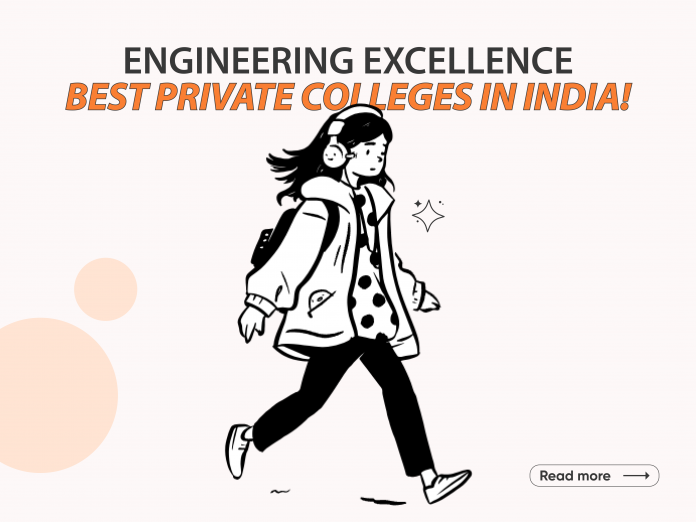Engineering education in India has rapidly expanded, with both public and private universities helping to amplify the country’s technical talent. While the Indian Institutes of Technology (IITs) and the National Institutes of Technology (NITs) command the upper echelon of the hierarchy of engineering education in the minds of prospective students, on the other hand, private universities such as BITS Pilani, VIT Vellore, Manipal Institute of Technology, the SRM Institute, and Lovely Professional University (LPU) are pushing the boundaries of modern engineering education.
What these private universities are doing, much beyond academic programs of excellence, is initiating an education revolution—creating future-ready professionals through trailblazing innovations, global exposures, and industry partnerships. LPU, for example, has established itself as a new-age university through the launch of student-empowering advanced technologies, varieties of customizable course content, and setting records in student placements.
Academic excellence and industry partnership
Today’s leading engineering colleges are focused on education that may not be entirely covered in the classroom, allied bundled learning with the interface of industry-related courses (e.g., notes on) and real-world problem-solving and education, some private universities, such as BITS and VIT. MIT (Manipal Institute of Technology) created a cutting-edge education environment with real-world problem solving.
LPU is also distinct because of its focus on significant industry engagement. With many partnerships with multinational corporations and international research organisations, LPU can develop customised programs in Artificial Intelligence, Robotics, Renewable Energy, Data Science, and Cybersecurity that align students with emerging technologies. Industry professionals also contribute to programs, through curriculum development, guest lectures and live projects, to enable students to graduate with the theoretical knowledge, examples and experience to be job-ready.
Infrastructure and Learning Resources
Modern physical infrastructure is a notable contrast with existing private education providers. Colleges are employing smart classrooms, collaborative learning environments, AI functionality labs, digital libraries etc. to cultivate an immersive educational experience.
LPU’s educational infrastructure, footprint and learning resources takes this a step further in contrast to similar private institutes – its greater than 600+ acres of campus, innovation studios, zones designated for AI/ML, aeronautical labs and maker spaces, all allow students to engage their ideas with ‘state-of-the-art’ equipment. The next step for LPU was to enable self-learning through varying technology enabled systems and provide opportunities for all who wish to engage in its additive educational objectives, in national and international competitions that stimulate creativity and innovative ideas.
Faculty and Research Opportunities
Private universities are establishing a strong footprint in faculty growth and research facilities. Professors with industry-related exposure guide students throughout patent filings, international publications, and applied research.The LPU’s faculty has researchers and technocrats from around the globe and assists students in obtaining research grants, entrepreneurship, and improvising real-world engineering problems. Its interdisciplinary research centres nurture innovation in biomedical engineering, drone technologies, sustainable infrastructure, and new engineering techniques affecting positively and meaningfully a certain aspect of society.
Placement and Career Opportunities
Placement is the measure of success for an institute by which they define their success and many private colleges are steadily matching or exceeding global standards. Business organizations like Google, Microsoft, Amazon, TCS, and Infosys remove students from India and the best students are recruited from the best it private engineering colleges in India regularly.
With a track record like this, LPU is clearly doing something right:
- Highest domestic engineering salary- ₹2.5 Cr per annum
- Highest international salary – ₹3 Cr per annum
- Average package of top students – ₹62 LPA
- Recruiters include some major names like : Apple, Cognizant, Bosch, Capgemini, Wipro, Palo Alto Networks
LPU not only assists students in securing placements with major corporates, but it also manages supports several student led entrepreneurship projects through incubators, seed funding and mentorship opportunities. A large, engaged alumni community reinforces professional opportunities through advice and connections.
LPUNEST: Your Gateway to LPU and your future.
LPU’s journey in engineering starts with LPUNEST – LPU National Entrance and Scholarship Test. This national level exam is not just a gateway to studying at LPU, it also provides students with the opportunity for scholarships worth 100% of the value of their tuition fees based on their performance in LPUNEST.
So, what makes LPUNEST credible as a benchmark?
- It is written by lakhs of students every year across India
- It has an objective score and clear criteria
- It assesses aptitude, passion and potential rather than just marks
- It is a gateway to world class programs at an affordable price to students
LPU also has lateral entry options to enable diploma holders to enter the the second or third year of their engineering degree respectively.
Financial Aspects and Scholarships:
While the tuition of engineering degrees from private institutions can be costlier than a public college, LPU offers many types of financial aid:
- Scholarships for merit-based and need-based candidates.
- Work-studies.
- Loan options through banks, for students who require financial assistance with generous payback options.
LPU’s scholarship ecosystem is one of the most embraced in India, a combined model that embraces scholarships for: academics and merit; sports; and cultural, and classification (for certain schools). To ensure that education is available to all deserving individuals.
The Future of Engineering Education:
Engineers of the future will be adaptive, collaborative, innovative and interdisciplinary. Leading educational institutions are adjusting their learning offerings by including blended programs in technology + business; technology + environment; and technology + healthcare.
LPU is leading the transformation in flexible academic pathways, such as “Design Your Degree” (students can choose minors, electives, and certifications). Courses in forthcoming industries such as blockchain, smart cities, automation, etc., and preparing them for next-generation issues.
Global Exposure and Internship Culture
Industry experience is important in preparing engineers who are work-ready for industry. Private universities are beginning industry partnerships with global corporations to facilitate internships, student exchanges, and collaborative projects.
At LPU, students are with some of the leading corporations, are working in live internships, and are attending global conferences. LPU has partnerships with greater than 200 global universities in USA, UK, Australia, Asia-pacific, etc., that provide students with semester abroad opportunities, dual degrees and research fellowships.
Conclusion
In the past, Top Private Engineering Colleges in India were only considered poor partners to IIT’s. Today they are hot spots of innovation, talent and transformation. Colleges like BITS Pilani, VIT, SRM, and LPU are taking private engineering college education to new heights, and are empowering the technology leaders of tomorrow.
In this regard, LPU is a leader with a firm commitment to educational evolution, providing fantastic placement opportunities, and a fully accessible global learning environment. As continuing higher education institutions, the timely provision of desirable admissions using LPUNEST, a future-ready curriculum, and a multitude of partnerships is enabling LPU prepare students to become graduates and leaders.














